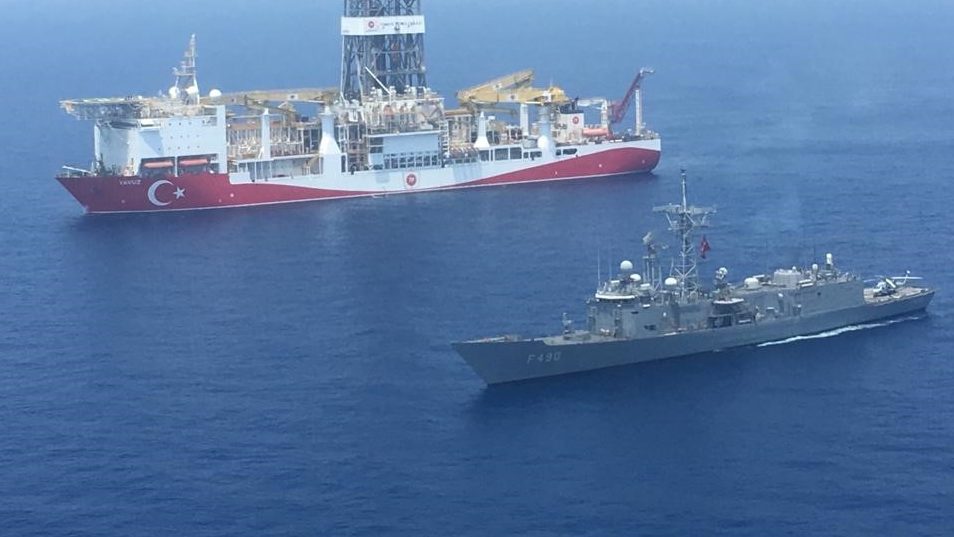Turkey, Greece on Possible Collision Course, Analysts Warn
NATO members and longtime rivals compete for maritime rights, gas reserves in Eastern Mediterranean
Heightened tensions between Turkey and Greece over competing claims to gas-rich Eastern Mediterranean waters could lead to a battle between the two NATO members, analysts say.
“The tensions are pretty high,” Berk Esen, assistant professor of international relations at Bilken University in Ankara, told The Media Line. “Turkey seems to be headed toward a clash, not just with the Greek Cypriots and Greece, but also [with] Israel and Egypt.”
Greece has called on Turkey to remove its Oruc Reis seismic research vessel from an area that Athens says is its continental shelf but over which both countries claim maritime rights. The Greeks warn that they will defend their sovereignty.
“The stakes that a bigger confrontation evolves out of a smaller accident are quite high now,” Istanbul-based analyst Kristian Brakel told The Media Line.
The stakes that a bigger confrontation evolves out of a smaller accident are quite high now
“Both sides, even the Turks – despite the saber rattling – do not want a military confrontation,” added Brakel, head of Heinrich Böll Foundation’s office in Turkey.
“Let it be known: The risk of an accident lurks when so many military assets are gathered in such a contained area,” Greek Prime Minister Kyriakos Mitsotakis was quoted by the Associated Press as saying earlier on Wednesday. “In such a case, responsibility lies upon the one who gives rise to these circumstances.”
Turkish Defense Minister Hulusi Akar, meanwhile, told the Reuters news agency that Ankara wanted to settle the dispute through dialogue.
Both countries are hoping to drill for gas after significant reserves were found off Cyprus, where Ankara has already carried out explorations. The Turks occupied the northern third of the island in 1974.
Turkey signed an agreement with Libya’s Government of National Accord near the end of last year, claiming rights over a section of sea stretching from the Turkish coast to Libya. But Greece has signed an agreement with Egypt that claims rights to an area overlapping that covered by Turkey-Libya deal.
The counterclaim led to a breakdown in talks between Athens and Ankara, and Turkey sent its ship to the area soon after.
Brakel says the tough stance of Turkey is probably a bid to force Greece back to negotiations, adding that neither side wants a confrontation.
Greece and Turkey are long-time rivals.
Athens denounced Turkish President Recep Tayyip Erdogan’s decision to convert the historic Hagia Sophia museum back to a mosque last month. The structure was built as an Eastern Orthodox church, the largest in the Byzantine Empire. In March, Turkey opened the way for migrants to enter the European Union through Greece.
Israel said earlier on Wednesday that it fully supports Greece.
Possible sanctions by the European Union – of which the Republic of Cyprus is a member – could put a brake on Turkey’s ambitions.
US sanctions in 2018 triggered a freefall in the Turkish lira and led to a recession. The struggling economy was a major factor in Erdogan’s party losing municipal elections in Istanbul and Ankara.
Esen says the Turkish president is hoping for a “rally-round-the-flag” effect to boost his domestic support, which polls have suggested is waning because of economic problems.
Timothy Ash, a London-based economist who focuses on Turkey, says Ankara wants an energy-exploration agreement to provide it with leverage against regional foes.
“I think both sides tend to know each other’s limits, as let’s not forget this stuff has been going on for years,” Ash wrote in an email to The Media Line. “Both, I think, are positioning for political leverage, so let’s hope it stays that way.”
I think both sides tend to know each other’s limits, as let’s not forget this stuff has been going on for years
Ash adds that Ankara seems to have been inspired by the actions of Russian President Vladimir Putin in Syria, where Moscow has supported President Bashar al-Assad to ensure he remains in power after the country’s civil war.
“By imposing themselves into the situation in Libya and the East Med energy game,” he wrote, “they realize they take leverage.”


